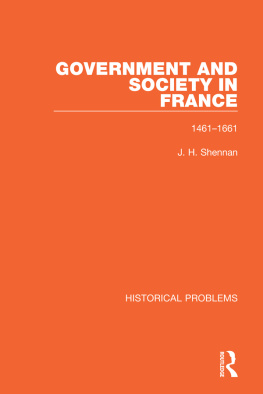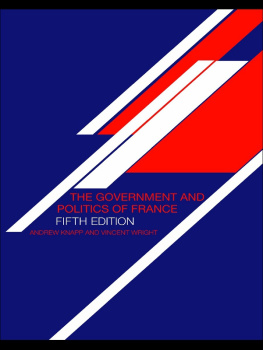Routledge Revivals
The Government of France
The Government of France
by
Joseph-Barthlemy
First published in 1924 by George Allen & Unwin Ltd.
This edition first published in 2019 by Routledge
2 Park Square, Milton Park, Abingdon, Oxon, OX14 4RN
and by Routledge
52 Vanderbilt Avenue, New York, NY 10017
Routledge is an imprint of the Taylor & Francis Group, an informa business
1924 by Taylor & Francis
All rights reserved. No part of this book may be reprinted or reproduced or utilised in any form or by any electronic, mechanical, or other means, now known or hereafter invented, including photocopying and recording, or in any information storage or retrieval system, without permission in writing from the publishers.
Publishers Note
The publisher has gone to great lengths to ensure the quality of this reprint but points out that some imperfections in the original copies may be apparent.
Disclaimer
The publisher has made every effort to trace copyright holders and welcomes correspondence from those they have been unable to contact.
A Library of Congress record exists under ISBN:
ISBN 13: 978-0-367-25988-4 (hbk)
ISBN 13: 978-0-429-29090-9 (ebk)
THE GOVERNMENT OF FRANCE
BY
JOSEPH-BARTHLEMY
AUTHORISED TRANSLATION BY
J. BAYARD MORRIS
(Scholar of Queen's College, Oxford.)
LONDON: GEORGE ALLEN & UNWIN LTD.
RUSKIN HOUSE, 40, MUSEUM STREET, W.C.1
First published in 1924.
Printed its Great Britain
Translators Note
THIS work was originally published in Paris in 1919. Since that time changes in the French constitution have made certain passages obsolete and M. Barthlemy has supplied me with new matter in order to bring the book up-to-date.
The most important change is to be found in ., "The Chamber of Deputies" (pp. 56-61 in the French edition). This is due to the Law of July 12th, 1919, which altered the method of electing deputies from that of the single voting system, or "scrutin uninominal," to that of the multiple voting system, or "scrutin de liste."
The restoration of Alsace and Lorraine affects the numbers of both the Chamber of Deputies and the Senate.
The actual state of groups in the Chamber is given in place of that existing in 1919. This involves changes in pp. 43-45 inclusive, of the French edition.
I am deeply indebted to my friend, Mr. W. H. Carter, B.A., of St. John's College, Oxford, for assistance in reading the proofs.
J.B.M.
FRENCH institutions of to-day, considered as a whole, form a composite building on which every new rgime for the last hundred years has left its mark. The foundation is provided by the social, legal, judicial and administrative system of the Napoleonic Empire, which was crowned in 1875 by the corner-stone of parliamentary democracy. Many other features have been left by other rgimes; thus France owes her general principles of common law and her administrative divisions to the Revolution. It is probably an exaggeration to say that the Republic has preserved intact the imperial organisation. The Napoleonic framework has been retained, but the material structure has been changed. Every new form of government since the July Monarchy has infused its own breath of liberty into the institutions created by Napoleon; the councils which in Napoleon's hands were instruments of central authority, have become, without change of title, elective and representative bodies of the people concerned; in place of the mere right of consultation they have received a power of decision. In a word, decentralisation has taken place within the framework of the imperial centralisation.
Nearly all the forms of government which have succeeded each other in France have left behind them, as it were, certain fertile alluvial deposits. The Restoration bequeathed to her parliamentary government and the financial principles of a free country. The July Monarchy defined, developed, and consolidated these principles, and drew up the great laws still in force, dealing with connecting roads, expropriation, etc. The Republic of 1846 inaugurated a work of unification, and definitely established universal suffrage. The Second Empire is responsible for the election machinery (laid down in the dictatorial decrees of the Prince President on February 2nd, 1852), the liberty of coalitions, and the distribution of authority between prefect and minister. The National Assembly gave France her departmental organisation (law of August 10th, 1871), and, most important of all, her political organisation.
French institutions in consequence do not present the appearance of a fine, foresquare building, whose parts are all harmoniously arranged according to a preconceived plan. Rather they resemble an old family mansion, in which each generation has made some improvement, introduced some new feature, left its mark. Here and there inconveniences are bound to result, apparent contradictions, calculated to irritate theorists in love with an absolute logic. But granted that the building has its defects, it has also very real advantages. Its venerable timbers have stood proof against time and weather. It has been steadily adapted, according to the lessons of experience, to the needs and to the essentially reasonable and moderate temper of the French people.
Chapter I
The Constitution
Every Frenchman is subject to a triple administration: the general administration of the State, that of the Department and that of the Commune. The Constitution is the fundamental document which determines the existence and attributes of the principal organs of the Statethose who are charged with its governmentsuch as the President of the Republic, the ministers and Parliament.
The French Constitution of to-day is not contained in a single document, but in five separate laws passed during the year 1875 by the National Assembly.
On September 4th. 1870, following the disaster of Sedan, the imperial regime crumpled up. A provisional government, composed of the deputies of Paris, assumed the direction of the destinies of France, under the title of the "Government of National Defence." Its first step, for it was only a government in fact, was to invite the country to elect an assembly which could give it regular institutions; but, since a large part of the country was occupied by German troops, the elections only took place after the signing of the armistice with the German Commander, the day after the capitulation of Paris. The armistice agreement stipulated that an Assembly should be nominated for the purpose of settling conditions of peace with Germany. It was this National Assembly which drew up the present Constitution.
It took nearly four years over the task: elected on February 8th, 1871, it sat for the last time on December 31st, 1875. Its delay was not due to any desire on its part to finish its work with great care so as to bequeath perfect institutions to France, but to its inability to arrive at a decision upon general principles. Elected " in an unhappy hour," this Assembly was for the most part conservative and monarchist. Its dearest wish was, therefore, to establish a monarchy; but the entanglements of past history were too much for it; there was only one throne, and there were three who wished to occupy it. The least redoubtable was the Prince Imperial, son of Napoleon III. The struggle therefore, was between the descendants of French kings; the Comte de Chambord, grandson of Charles X., representing the elder and legitimate Bourbon line; and the Comte de Paris, grandson of Louis-Philippe, representing the Orleans line, which the revolution of July had advanced to the throne. In 1873 a fusion occurred. The older line being about to die out in the person of the Comte de Chambord, the Orleanists decided to withdraw their opposition, since the princes of Orleans were the legitimate descendants of the last Bourbon. This compromise proved useless, the Comte de Chambord imposing conditions on his acceptation of the throne which the new France could not accept, and which were typified by the substitution of the old lilies for the tricolour. Wearied by so many negotiations and intrigues, the National Assembly resigned itself unwillingly to the establishment of a republic. The Wallon amendment which assumed indirectly the republican form, since it determined the present method of appointing the President of the Republic, was passed on January 30th, 1875, by a majority of one.













